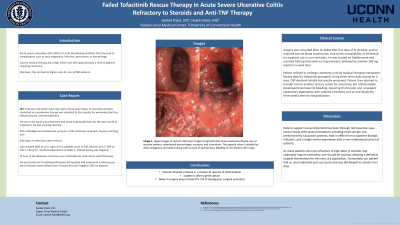Back


Poster Session A - Sunday Afternoon
Category: IBD
A0401 - Failed Tofacitinib Rescue Therapy in Acute Severe Ulcerative Colitis Refractory to Steroids and Anti-TNF Therapy
Sunday, October 23, 2022
5:00 PM – 7:00 PM ET
Location: Crown Ballroom

Has Audio
- SP
Sanket Patel, DO
University of Connecticut Health
Presenting Author(s)
Sanket Patel, DO1, Haleh Vaziri, MD2
1University of Connecticut Health, West Hartford, CT; 2UConn Health, Farmington, CT
Introduction: Acute severe ulcerative colitis (ASUC) is a life-threatening condition that may lead to complications such as toxic megacolon, infection, perforation, or hemorrhage. Current medical therapy has a high failure rate with approximately a third of patients requiring colectomy.
Case Description/Methods: A 60-year-old Indian man with a three-year history of ulcerative proctitis on mesalamine therapy was admitted to the hospital for diarrhea, abdominal pain, and hematochezia after failing outpatient oral prednisone and rectal budesonide foam. His vital signs on admission were normal. Labs showed WBC of 12.5, Hgb of 10.6, platelet count of 530, albumin of 2.7, CRP of 143.2, ESR of 75, and fecal calprotectin of 1860. C. difficile testing was negative. CT scan showed mild colonic wall thickening. The patient was started on IV methylprednisolone 60 mg/daily. Colonoscopy which showed severe (Mayo Score 3) pancolitis with negative CMV on biopsies. Surgery was consulted after his symptoms did not improve after five days of steroid therapy and he required several blood transfusions. Due to the unavailability of inpatient Infliximab use in our hospital at the time, he was started on Adalimumab and received 160 mg dose, followed by another 160 mg injection in 9 days due to the lack of significant improvement after first dose. The patient refused to undergo colectomy until all medical therapies failed. Given some data on the treatment of ASUC with Tofacitinib, he was started on a 10 mg dose three times daily. CRP declined initially but quickly worsened. Patient decided to transfer care to another tertiary center for colectomy. While awaiting transfer, he developed brisk lower GI bleeding and became hypotensive. He was moved to the ICU and required emergent exploratory laparotomy with colectomy and an end ileostomy, three weeks after his admission to the hospital.
Discussion: Despite recent data demonstrating some efficacy of tofacitinib as a rescue therapy with concomitant IV steroids, our case failed to respond to this treatment. Further delay in surgical intervention likely resulted in the need for emergent surgery. Data to support rescue tofacitinib is based on observational and retrospective case-control data with several limitations. Clinicians should be cautious delaying a definitive surgical intervention until more robust data supports tofacitinib rescue therapy for this sick population. Fortunately, this patient had an uncomplicated post-op course and was discharged to rehab in ten days.
Disclosures:
Sanket Patel, DO1, Haleh Vaziri, MD2. A0401 - Failed Tofacitinib Rescue Therapy in Acute Severe Ulcerative Colitis Refractory to Steroids and Anti-TNF Therapy, ACG 2022 Annual Scientific Meeting Abstracts. Charlotte, NC: American College of Gastroenterology.
1University of Connecticut Health, West Hartford, CT; 2UConn Health, Farmington, CT
Introduction: Acute severe ulcerative colitis (ASUC) is a life-threatening condition that may lead to complications such as toxic megacolon, infection, perforation, or hemorrhage. Current medical therapy has a high failure rate with approximately a third of patients requiring colectomy.
Case Description/Methods: A 60-year-old Indian man with a three-year history of ulcerative proctitis on mesalamine therapy was admitted to the hospital for diarrhea, abdominal pain, and hematochezia after failing outpatient oral prednisone and rectal budesonide foam. His vital signs on admission were normal. Labs showed WBC of 12.5, Hgb of 10.6, platelet count of 530, albumin of 2.7, CRP of 143.2, ESR of 75, and fecal calprotectin of 1860. C. difficile testing was negative. CT scan showed mild colonic wall thickening. The patient was started on IV methylprednisolone 60 mg/daily. Colonoscopy which showed severe (Mayo Score 3) pancolitis with negative CMV on biopsies. Surgery was consulted after his symptoms did not improve after five days of steroid therapy and he required several blood transfusions. Due to the unavailability of inpatient Infliximab use in our hospital at the time, he was started on Adalimumab and received 160 mg dose, followed by another 160 mg injection in 9 days due to the lack of significant improvement after first dose. The patient refused to undergo colectomy until all medical therapies failed. Given some data on the treatment of ASUC with Tofacitinib, he was started on a 10 mg dose three times daily. CRP declined initially but quickly worsened. Patient decided to transfer care to another tertiary center for colectomy. While awaiting transfer, he developed brisk lower GI bleeding and became hypotensive. He was moved to the ICU and required emergent exploratory laparotomy with colectomy and an end ileostomy, three weeks after his admission to the hospital.
Discussion: Despite recent data demonstrating some efficacy of tofacitinib as a rescue therapy with concomitant IV steroids, our case failed to respond to this treatment. Further delay in surgical intervention likely resulted in the need for emergent surgery. Data to support rescue tofacitinib is based on observational and retrospective case-control data with several limitations. Clinicians should be cautious delaying a definitive surgical intervention until more robust data supports tofacitinib rescue therapy for this sick population. Fortunately, this patient had an uncomplicated post-op course and was discharged to rehab in ten days.
Disclosures:
Sanket Patel indicated no relevant financial relationships.
Haleh Vaziri indicated no relevant financial relationships.
Sanket Patel, DO1, Haleh Vaziri, MD2. A0401 - Failed Tofacitinib Rescue Therapy in Acute Severe Ulcerative Colitis Refractory to Steroids and Anti-TNF Therapy, ACG 2022 Annual Scientific Meeting Abstracts. Charlotte, NC: American College of Gastroenterology.
